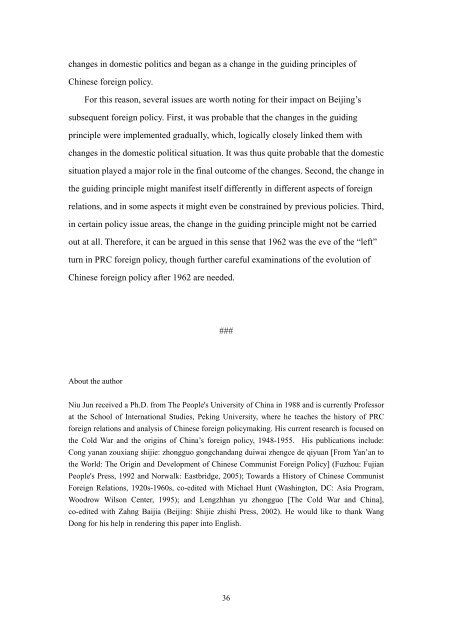1962: The Eve of the Left Turn in China's Foreign Policy - Claude Arpi
1962: The Eve of the Left Turn in China's Foreign Policy - Claude Arpi
1962: The Eve of the Left Turn in China's Foreign Policy - Claude Arpi
You also want an ePaper? Increase the reach of your titles
YUMPU automatically turns print PDFs into web optimized ePapers that Google loves.
changes <strong>in</strong> domestic politics and began as a change <strong>in</strong> <strong>the</strong> guid<strong>in</strong>g pr<strong>in</strong>ciples <strong>of</strong>Ch<strong>in</strong>ese foreign policy.For this reason, several issues are worth not<strong>in</strong>g for <strong>the</strong>ir impact on Beij<strong>in</strong>g’ssubsequent foreign policy. First, it was probable that <strong>the</strong> changes <strong>in</strong> <strong>the</strong> guid<strong>in</strong>gpr<strong>in</strong>ciple were implemented gradually, which, logically closely l<strong>in</strong>ked <strong>the</strong>m withchanges <strong>in</strong> <strong>the</strong> domestic political situation. It was thus quite probable that <strong>the</strong> domesticsituation played a major role <strong>in</strong> <strong>the</strong> f<strong>in</strong>al outcome <strong>of</strong> <strong>the</strong> changes. Second, <strong>the</strong> change <strong>in</strong><strong>the</strong> guid<strong>in</strong>g pr<strong>in</strong>ciple might manifest itself differently <strong>in</strong> different aspects <strong>of</strong> foreignrelations, and <strong>in</strong> some aspects it might even be constra<strong>in</strong>ed by previous policies. Third,<strong>in</strong> certa<strong>in</strong> policy issue areas, <strong>the</strong> change <strong>in</strong> <strong>the</strong> guid<strong>in</strong>g pr<strong>in</strong>ciple might not be carriedout at all. <strong>The</strong>refore, it can be argued <strong>in</strong> this sense that <strong>1962</strong> was <strong>the</strong> eve <strong>of</strong> <strong>the</strong> “left”turn <strong>in</strong> PRC foreign policy, though fur<strong>the</strong>r careful exam<strong>in</strong>ations <strong>of</strong> <strong>the</strong> evolution <strong>of</strong>Ch<strong>in</strong>ese foreign policy after <strong>1962</strong> are needed.###About <strong>the</strong> authorNiu Jun received a Ph.D. from <strong>The</strong> People's University <strong>of</strong> Ch<strong>in</strong>a <strong>in</strong> 1988 and is currently Pr<strong>of</strong>essorat <strong>the</strong> School <strong>of</strong> International Studies, Pek<strong>in</strong>g University, where he teaches <strong>the</strong> history <strong>of</strong> PRCforeign relations and analysis <strong>of</strong> Ch<strong>in</strong>ese foreign policymak<strong>in</strong>g. His current research is focused on<strong>the</strong> Cold War and <strong>the</strong> orig<strong>in</strong>s <strong>of</strong> Ch<strong>in</strong>a’s foreign policy, 1948-1955. His publications <strong>in</strong>clude:Cong yanan zouxiang shijie: zhongguo gongchandang duiwai zhengce de qiyuan [From Yan’an to<strong>the</strong> World: <strong>The</strong> Orig<strong>in</strong> and Development <strong>of</strong> Ch<strong>in</strong>ese Communist <strong>Foreign</strong> <strong>Policy</strong>] (Fuzhou: FujianPeople's Press, 1992 and Norwalk: Eastbridge, 2005); Towards a History <strong>of</strong> Ch<strong>in</strong>ese Communist<strong>Foreign</strong> Relations, 1920s-1960s, co-edited with Michael Hunt (Wash<strong>in</strong>gton, DC: Asia Program,Woodrow Wilson Center, 1995); and Lengzhhan yu zhongguo [<strong>The</strong> Cold War and Ch<strong>in</strong>a],co-edited with Zahng Baijia (Beij<strong>in</strong>g: Shijie zhishi Press, 2002). He would like to thank WangDong for his help <strong>in</strong> render<strong>in</strong>g this paper <strong>in</strong>to English.36

















